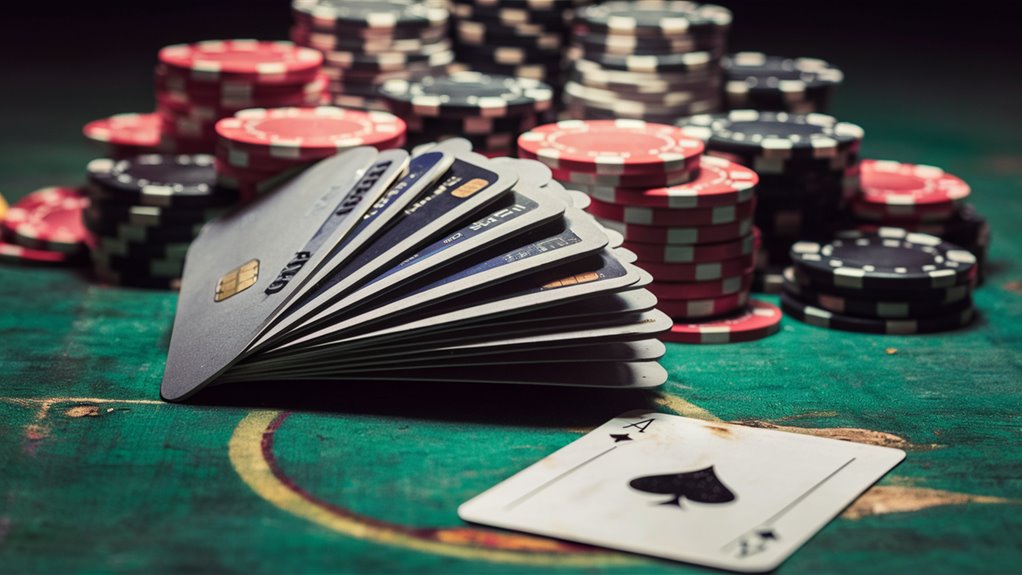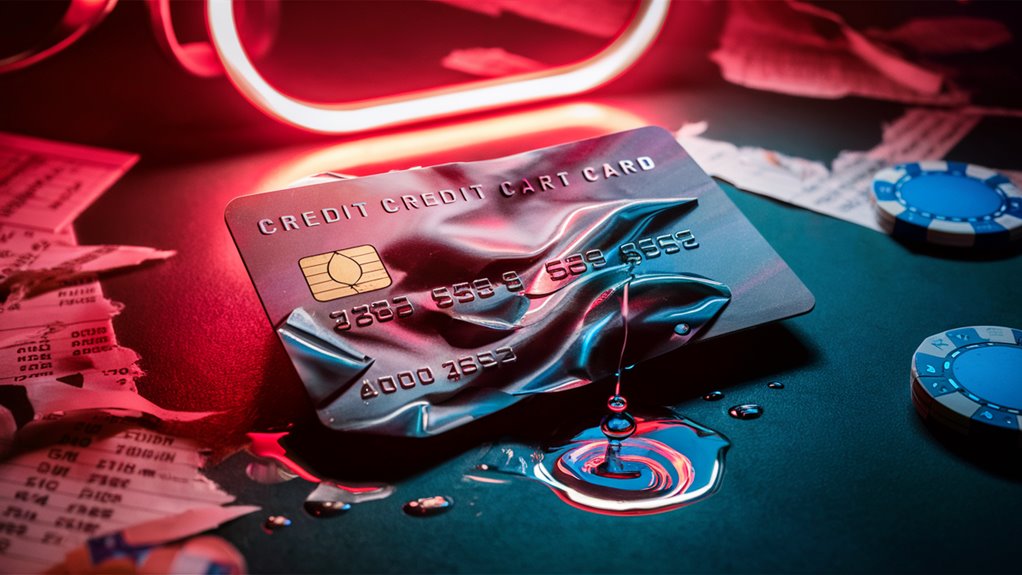
How Using Credit Cards Can Lead to Gambling Debts

Dangers of Using Credit Cards for Gambling
Using credit cards for gambling starts a harmful cycle with several risky steps. When people use credit for casino purchases, they face instant interest charges, high cash advance fees of 3-5%, and annual rates (APRs) over 20% – no breaks or extra perks. 먹튀검증 공식 추천 확인하기
Financial Problems and Hidden Costs
Borrowed cash gives a false sense of safety while the built-in casino advantage means losses over time. Small payments don’t reduce the main debt as rising interest adds up quickly. Using many credit cards leads to a larger financial mess.
Digital Purchases and Warning Signs
Electronic payments make it hard to track spending, and large credit limits lead to riskier bets. Easy access to borrowed money and few mental barriers create the perfect conditions for problem gambling.
Breaking the Debt Cycle
Managing credit card debt demands quick action:
- Stop gambling purchases
- Set strict spending limits
- Seek help from financial experts
- Find alternative payment methods
- Establish safe gambling limits
Understanding these risks with credit card gambling is crucial to avoid huge financial issues and protect your budget.
Understanding the Cycle: Know the Risks of Gambling Debt
Dangerous Paths in Credit Card Gambling
Credit card gambling creates a dangerous money spiral that can quickly ruin even the most stable financial situation.
The combination of high-interest debt from credit cards and gambling losses is particularly dangerous and escalates quickly. Using credit cards for bets means you’re gambling with borrowed cash while incurring large interest charges.
How the Debt Cycle Expands
The typical gambling debt cycle begins when players max out their first credit card on bets.
This often leads to obtaining more credit cards to cover increasing losses or continue gambling. As credit card debt grows, many gamblers feel compelled to bet more to recoup their losses. This risky strategy often results in severe financial troubles.
Interest and House Edge: A Dangerous Duo
The math behind finances creates a terrible dual effect:
- The casino’s house edge ensures consistent losses for gamblers
- Credit card interest rates (often over 20% APR) escalate debt quickly
- Monthly interest charges apply to both gambling losses and accrued interest
- Rising interest creates a tough debt cycle to break
This combination makes credit card gambling exceptionally risky, as each bet adds more financial pressure through potential losses and definite interest charges.
Immediate Money, Harsh Realities: The True Cost of Credit Card Gambling
The Subtle Lure of Credit Card Gambling
Credit card gambling may seem like an easy source of money for betting, but this ease conceals deep financial traps.
Just using a card for wagering creates a web of debts that extend far beyond the initial money lost.
Two Major Financial Hits
When gamblers use credit cards for bets, they encounter a dual financial impact:
- Initial gambling losses from unsuccessful bets
- Accumulating interest charges that increase monthly
- Cash advance fees on gambling purchases
- Immediate interest accumulation with no pauses
Breaking Down Actual Costs
A $1,000 gambling expense on a credit card typically results in:
- 20% APR leading to $200 in annual interest charges
- 3-5% instant cash advance fees ($30-50)
- Higher rates for gambling-focused purchases
- Additional charges for late or missed payments
Long-Term Financial Struggles
The compounding effect of credit card gambling fuels a rising debt cycle:
- Interest charges accumulate daily
- Small payments barely cover interest expenses
- Initial gambling debt remains largely unchanged
- Credit scores drop due to high usage rates
Additional Fees and Charges
Financial institutions treat gambling purchases uniquely:
- Immediate cash advance interest charges
- Higher APRs than standard purchases
- Transaction fees commence immediately
- No rewards points or cashback benefits
This “easy money” strategy becomes a long-term financial burden that could take years to resolve, making credit card gambling one of the most expensive ways to bet.
The Perilous Combination of Betting and Borrowing

Understanding the Risks of Gambling with Credit
The connection of gambling and credit creates a perilous financial landscape where borrowers face immense risks when these high-stake actions combine.
Credit cards act as precarious aids, giving gamblers the opportunity to exceed financial limits and chase losses with borrowed money.
Betting with credit ultimately equates to gambling with high-interest loans.
The Negative Cycle of Credit Card Gambling
Escalating Financial Risk
Casino credit card purchases typically start at ATMs or on online gambling platforms.
As gambling losses accumulate, users often resort to additional credit options, such as balance transfers and cash advances.
This results in a compounding effect where mounting interest charges meet gambling losses, leading to increasingly desperate attempts to recoup money through higher-risk betting actions.
Hidden Costs and Interest Concerns
Credit card companies categorize gambling purchases as cash advances, initiating high interest rates immediately with no pauses.
This subjects bettors to heavy interest charges from the moment of purchase.
The combination leads to a massive debt spiral, where each credit card purchase deepens the financial hole through growing interest and gambling losses.
Key Financial Impact Points
- Immediate high interest rates on gambling purchases
- No grace period on betting-related charges
- Compounding interest effects on gambling debt
- Using multiple cards increases overall risk
- Cash advance fees contribute to purchase costs
- Less credit availability affects financial flexibility
Signs of Trouble in Gambling: Crucial Warnings to Observe
Early Indicators of Gambling Issues
Problem gambling tends to develop gradually, with several clear signs appearing before major issues arise.
Recognizing these early can prevent severe financial and personal consequences.
Financial Warning Signs
- Attempting to recover losses with borrowed money or credit cards
- Concealing bank statements or gambling-related purchases
- Placing larger bets to maintain excitement
- Allocating essential funds for bills to gambling
Behavioral Warnings
Poor gambling habits manifest through:
- Extended gambling sessions beyond what was planned
- Withdrawing from social and fun activities
- Constantly thinking about gambling in daily life
- Experiencing anger when attempting to reduce gambling
- Lying about gambling activities
Impacts on Everyday Life
Major warning signs include:
-
- Neglecting job responsibilities because of gambling
- Missing family events for betting sessions
- Relationships deteriorating
- Failing to meet financial obligations
Ending Gambling Debt: Comprehensive Recovery Guide
Recognizing and Halting the Cycle
Addressing gambling addiction and associated debt requires prompt, decisive actions to exit the harmful cycle.
The primary step is blocking access to gambling venues and online betting sites. Initiate comprehensive self-exclusion programs and lock all credit cards to halt further debt.
Reviewing Debt and Creating a Strategy
List all debts from gambling, sorting them by interest rates and priority.
Devise a thoughtful debt repayment strategy that prioritizes high-interest debts while maintaining funds for essential living expenses.
Negotiate with creditors to seek improved terms, such as reduced interest rates or modified payment plans.
Essential Help and Tools
Recovering from gambling addiction requires support for both financial and emotional aspects. Connect with:
-
-
-
- Authorized gambling counselors
- Financial experts skilled in debt recovery
- Peer support groups
- Credit counseling for debt management skills
-
-
Establishing a Solid Financial Foundation
Build a strong financial recovery foundation through:
-
-
-
- Automated bill payments
- Starting a savings account for emergencies
- Implementing budget limits
- Engaging trusted individuals to help maintain accountability
-
-
Sustaining Recovery Practices
Maintain long-term success through sound financial habits:
-
-
-
- Regularly monitor your finances
- Maintain open communication with your support network
- Adhere to spending limits
- Continuously educate yourself about personal finance
- Explore alternative stress management techniques
-
-
This comprehensive plan addresses both immediate debt concerns and long-term recovery sustainability.
Secure Betting Practices Without Credit Cards: Essential Guide
Strict Cash-Only Guidelines for Safe Gambling
Responsible gambling necessitates strict adherence to a cash-only rule.
Setting firm cash limits before entering any gambling venue and leaving credit cards at home creates a necessary barrier against excessive spending and chasing losses.
Viewing Gambling Solely as Entertainment
Perceiving gambling as only a leisure expense rather than a means to earn money fosters healthier perspectives on betting.
Cash transactions heighten awareness of expenditure, as physical money provides immediate feedback on gambling actions.
Allocate specific entertainment budgets for gambling, just like for other leisure activities.
Financial Control Strategies
Prudent Banking Practices
-
-
-
- Open a bank account specifically for gambling
- Utilize debit cards with withdrawal limits
- Closely monitor your expenditures
-
-
Mandatory Safety Measures
-
-
-
- Avoid using borrowed money for betting Is Poker a Game of Skill or Just Luck
- Stay clear of credit-based bets
- Implement fixed spending caps
-
-
Managing Risks with Cash Control
Exclusively cash-based gambling offers optimal control over spending and helps prevent poor habits.
This approach, combined with stringent financial rules, lays a robust framework for maintaining healthy gambling practices and avoiding debt accumulation.
Vital Safety Tactics
-
-
- Establish inflexible spending limits that cannot be altered
- Initiate self-exclusion to prevent accessing credit
- Plan effective management of your gambling finances
-


